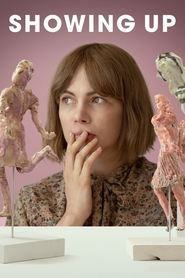It's curious how Kelly Reichardt can employ a bird with a broken wing in her story, a symbol so clichéd that even a 12-year-old might cringe, and yet it doesn't feel like that at all. Unrelatedly, I completely loved the way she ate her pasta in an attempt to get the other artist to go away.
Refreshingly, there are no arbiters of success in sight—no gallery owners, no critics—so the show is an isolated and tangible goal of self-actualization in and of itself.
— Patrick Preziosi (Slant Magazine)
There is a textural specificity to the qualities of light in Reichardt’s work, one far beyond the incredibly dull observation that the places she films look like the places that they are. This isn’t just due to architecture, landscape and flora, but because of the way that light never feels dressed up. [T]he individualist narrative of the artist is wholly undermined by the time we reach Showing Up’s conclusion, but with such subtlety that it could be missed that Lizzie’s actualization has come from her mutual acceptance of community. [W]hat Showing Up shows with so much clarity [i]s that even this necessarily self-centered art world, one focused on these great individuals, is held up by communities.
— Alex Lei (Paste Magazine)
Williams’ performance is so unforced and implosive that it can seem like showing up is all she really had to do, but it’s extremely hard to make acting look this easy — to play an entire symphony of notes in the span of a single octave. On screen in almost every frame of the film, Williams inhabits Lizzy as if simply letting the character move through life as she did before we met her and probably always will, pushing her through each scene like a lint roller that’s gradually accumulating small resentments. It becomes hard to tell which bits are new, and which were already there.
— David Ehrlich (IndieWire)

